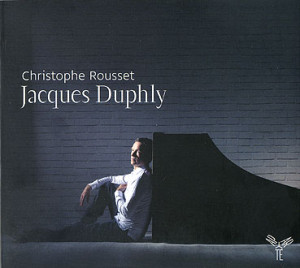Jacques Duphly is remembered not so much as a composer, but as one of the best harpsichord teachers and performers in Paris during the instrument’s “Golden Age”. His extant oeuvre consists of only four books of harpsichord music (52 compositions in all), technically adept and often challenging works that specialists have tended to regard more as teaching aids than as original, innovative contributions to the literature. In the notes, harpsichordist Christophe Rousset essentially agrees with this assessment, yet given how thoughtful, and in numerous instances how provocative his performances are of these often remarkably beautiful, lively, and charming works, he clearly makes a case that they’re certainly unworthy of neglect.
The Chaconne en fa, early on the first disc (of two), is initially impressive with its widely shifting, extremely varied take on the dance. It eventually evolves to the point where tempos and dynamics change so drastically that the overall effect is more like an extended improvisational study of ornamentation rather than a cohesive piece. Following the Chaconne is the fierce, equally compelling Medée, in which Rousset interrupts the work’s brisk momentum with only a few brief staccato interludes. Anyone familiar with François Couperin’s well-known Les Barricades Mysterieuses will delight in Duphly’s more delicate homage, Rondeau en do, with its noticeably less mysterious rhythmic stream. By way of contrast, Rousset follows the piece with another rollicking upbeat selection, the hyperactive gigue La Millettina. Other favorites include the clever Scarlatti-influenced La Cazamajor and La Lanza, along with Les Colombes, with its clear programmatic figures in imitation of viola da gamba strokes in homage to you know who.
Many others have offered Duphly recitals on CD, though none has satisfied as Rousset consistently does here. While her recent effort is very respectable, Elisabeth Joyé (Alpha) has a tendency to unnecessarily linger, often imbuing her program with a sense of overtly deliberate faux elegance (Rousset’s tempos and timings are consistently more lively and shorter than hers, with the one exception of Les Graces, which, although nearly two minutes longer, achieves a notable sense of delicacy and refinement). In their now decades-old complete cycles, John Paul (Lyrichord) and Yannick Le Gaillard (Adda) also suffer from a lack of variety and risk, deficiencies that Rousset never allows to mar his performances.
The sound on this Aparte set is spectacular. The combination of the magnificent vintage 1776 Christian Kroll instrument (one of the very few that exists entirely in its original state), the excellent acoustics of the La Galerie Dorée recording venue, Florent Olivier’s brilliant engineering, and of course Rousset’s peerless articulation, have resulted in one of the finest, most life-like harpsichord recitals available. Highly recommended.
































